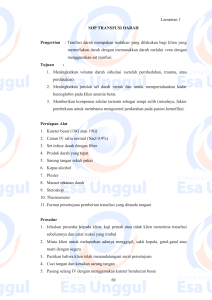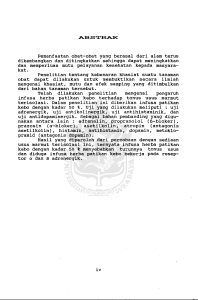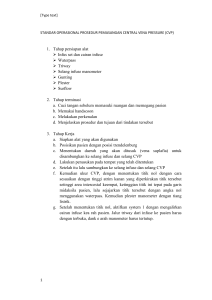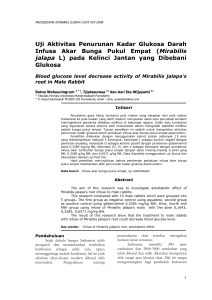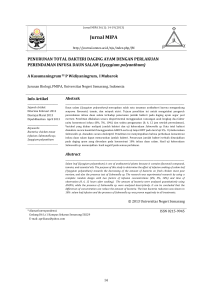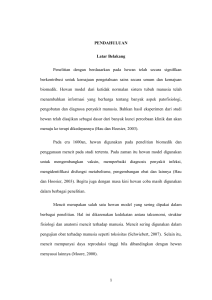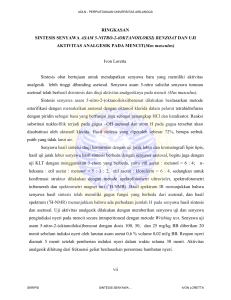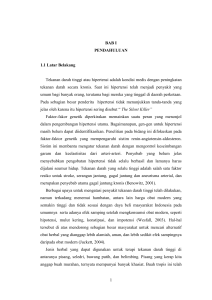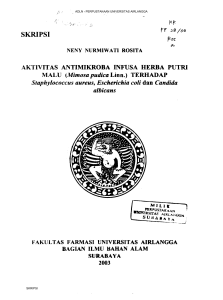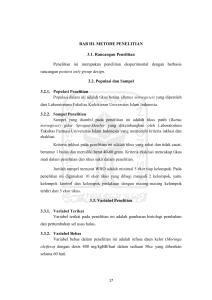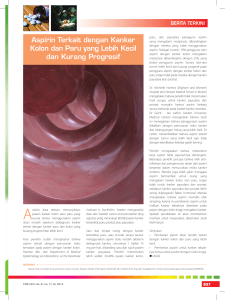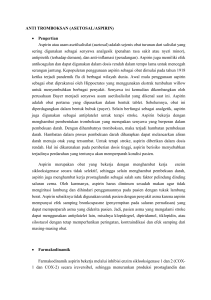INTISARI Tukak lambung merupakan salah satu
advertisement
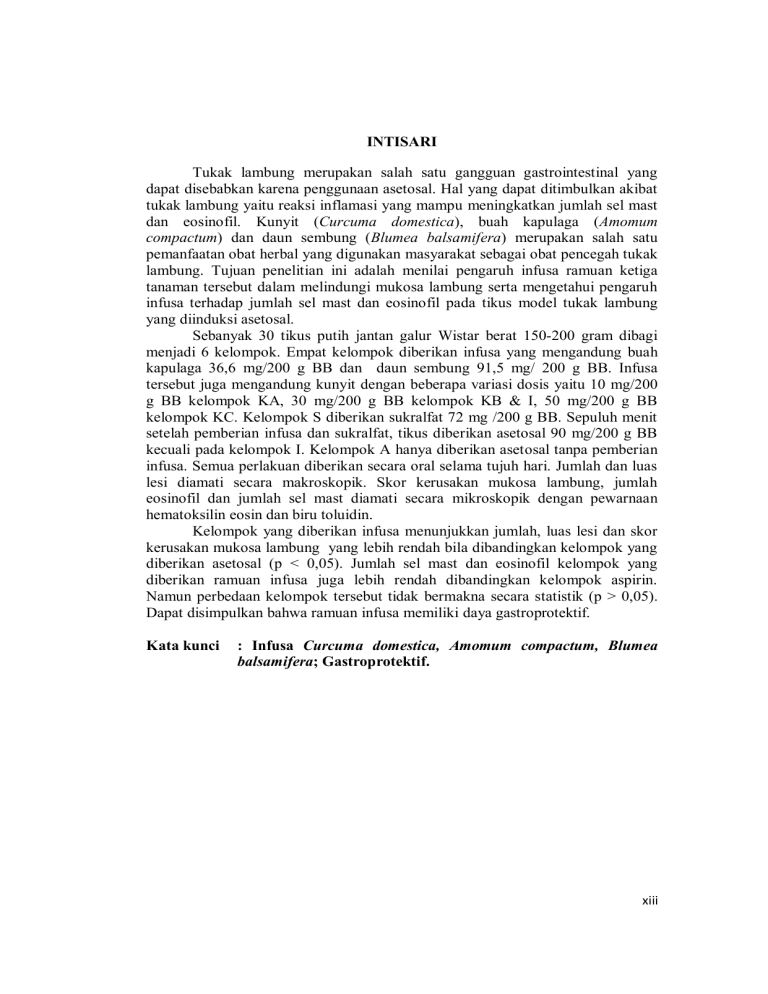
INTISARI Tukak lambung merupakan salah satu gangguan gastrointestinal yang dapat disebabkan karena penggunaan asetosal. Hal yang dapat ditimbulkan akibat tukak lambung yaitu reaksi inflamasi yang mampu meningkatkan jumlah sel mast dan eosinofil. Kunyit (Curcuma domestica), buah kapulaga (Amomum compactum) dan daun sembung (Blumea balsamifera) merupakan salah satu pemanfaatan obat herbal yang digunakan masyarakat sebagai obat pencegah tukak lambung. Tujuan penelitian ini adalah menilai pengaruh infusa ramuan ketiga tanaman tersebut dalam melindungi mukosa lambung serta mengetahui pengaruh infusa terhadap jumlah sel mast dan eosinofil pada tikus model tukak lambung yang diinduksi asetosal. Sebanyak 30 tikus putih jantan galur Wistar berat 150-200 gram dibagi menjadi 6 kelompok. Empat kelompok diberikan infusa yang mengandung buah kapulaga 36,6 mg/200 g BB dan daun sembung 91,5 mg/ 200 g BB. Infusa tersebut juga mengandung kunyit dengan beberapa variasi dosis yaitu 10 mg/200 g BB kelompok KA, 30 mg/200 g BB kelompok KB & I, 50 mg/200 g BB kelompok KC. Kelompok S diberikan sukralfat 72 mg /200 g BB. Sepuluh menit setelah pemberian infusa dan sukralfat, tikus diberikan asetosal 90 mg/200 g BB kecuali pada kelompok I. Kelompok A hanya diberikan asetosal tanpa pemberian infusa. Semua perlakuan diberikan secara oral selama tujuh hari. Jumlah dan luas lesi diamati secara makroskopik. Skor kerusakan mukosa lambung, jumlah eosinofil dan jumlah sel mast diamati secara mikroskopik dengan pewarnaan hematoksilin eosin dan biru toluidin. Kelompok yang diberikan infusa menunjukkan jumlah, luas lesi dan skor kerusakan mukosa lambung yang lebih rendah bila dibandingkan kelompok yang diberikan asetosal (p < 0,05). Jumlah sel mast dan eosinofil kelompok yang diberikan ramuan infusa juga lebih rendah dibandingkan kelompok aspirin. Namun perbedaan kelompok tersebut tidak bermakna secara statistik (p > 0,05). Dapat disimpulkan bahwa ramuan infusa memiliki daya gastroprotektif. Kata kunci : Infusa Curcuma domestica, Amomum compactum, Blumea balsamifera; Gastroprotektif. xiii ABSTRACT Gastric ulcer is gastrointestinal disorder that caused several factor, including by aspirin. Gastric ulcers induce inflammatory reaction that will increase the number of mast cells and eosinophils. Infuse of turmeric (Curcuma domestica), cardamom pods (Amomum compactum) and sembung leaf (Blumea balsamifera) has been used as gastroprotective agents. The purpose of this study was to assess the effectivity of the infuse in protecting gastric mucosa in rat model of aspirin-induced gastric ulcers. Thirty male Wistar rats weighing 150-200 g were divided into 6 groups. Four groups were given infuse that consisted of cardamom pods 36,6 mg/200 g BW and sembung leaf 91,5 mg/200 g BW. The infuse also consisted of turmeric in various ammount i.e. 10 mg/200 g BW in KA, 30 mg/200 g BW in KB & I, 50 mg/200 g BW in KC. One group S received sucralfat 72 mg /200 g BW. Ten minutes after received infuse or sucralfat, the rats were given aspirin 90 mg/200 g BW except group I. Another group A only received aspirin without any protective agent. All treatments were adsministered orally for seven days. Before termination, all rats were fasted for 24 hours. The number and area of the gastric ulcer were counted and measured macroscopically. Score of mucosal damage and the number of eosinophils as well as the number of mast cells were observed in paraffin sections stained with Hematoxylin Eosin and Toluidine Blue, respectively. The groups received herbal infuse showed less number and smaller area of gastric ulcer as well as smaller score of mucosal damage compared to aspirin group (p < 0,05). The number of mast cells and eosinophil of herbal groups also smaller than that of aspirin group. However, the difference between those groups were not statistically significant (p > 0.05). No difference in gastroprotective effects between various doses of the herbal infuse of turmeric can be observed. In conclusion, the herbal infusion has gastroprotective effect. Keywords: Infuse of Curcuma domestica, Amomum compactum, Blumea balsamifera; gastroprotective. xiv
